by Pinchas Cohen
Key Events
Yesterday, though Asian stocks—except for Chinese shares in both Hong Kong and the mainland—fell to start the trading week, European and US stocks climbed.
The news that current Fed Chair Janet Yellen would also leave the Fed's board of governors in early February once her successor takes over as Fed Chairman, was met with indifference by the market. Considering the uncertainty that hit investors when her second-in-command, then Vice Chair Stanley Fischer suddenly announced his early resignation in October, that's certainly an unexpected reaction.
Under Yellen's watch the unemployment rate has fallen from 6.7% at the beginning of 2014 to 4.1% today. As well, the US's economic expansion continued during her tenure. It currently ranks as the third-longest period of growth in history for the nation's economy.
The S&P 500 advanced after two consecutive weekly declines. However, traders punched out after prices failed to maintain their session highs, on the news the US Justice Department filed a lawsuit yesterday to prevent AT&T (NYSE:T) from completing its $85.4 billion takeover of Time Warner (NYSE:TWX), alleging antitrust issues.
Global Economic Affairs
While investors are taking the departure of Yellen in stride, notwithstanding that her position on the Fed's board of governors wouldn't have expired until 2024, there may still be a market reaction ahead. When the realization dawns that her departure creates a fourth Fed vacancy for President Donald Trump to fill, next year's interest rates could become less predictable.
Wednesday's release of the Fed Minutes will open a window into policy makers’ commitment to higher interest rates in December. The Fed's tasks include the challenge of supporting long-term Treasuries—such as the 10-year—currently seeing the narrowest gap with short-term Treasuries—including the 2-year—in a decade.
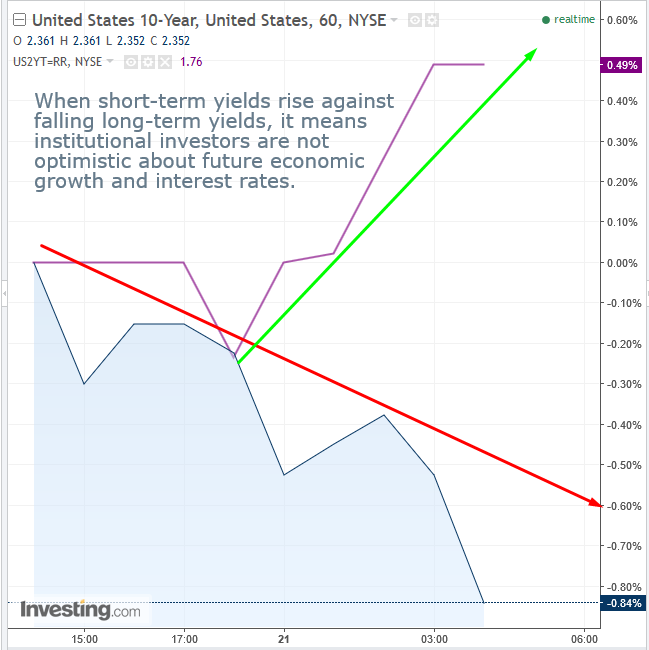
The inability of long-term Treasuries to move higher creates a vicious cycle, in which the causal relationship is murky. This could be occurring because institutional investors now have a dismal outlook on sustainable economic growth, or a circular, self-fulfilling prophecy could be forming, in which the dismal outlook increases investor negativity, and so forth. The Fed's challenge: even a December hike won’t help long-term Treasuries, since it's already priced in.
With the Thanksgiving holiday this coming Thursday, investors are in for a shortened week that's typically known to be slow for the stock market. It also marks the opening shot for companies to implement their year-end, tax-related strategies. As well as it being a shorter week, trading volume is traditionally thin since many start their holiday-related travel early.
This year, however, the holiday break brings added complexity, putting additional pressure on markets. With lawmakers on Capitol Hill also curtailing their activities, tax reform—the biggest market-mover over the last few months—will be brought to a standstill until the holiday break is over. Having said that, since these reasons have no sway on share value or inherent sentiment, the negative effects should be limited, both in time and price.
This morning, stocks in Asia rallied across the board, led by Tokyo and Hong Kong, though South Korea’s KOSPI bucked the trend.
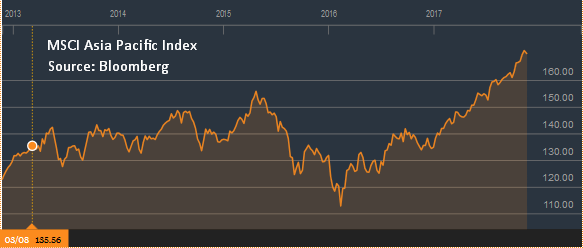
The MSCI Asia Pacific Index neared a decade high. Chinese stocks resumed their rally, led by a rebound in financial shares, which earlier in the week took a hit on the governments’ repeated warnings about unsustainable gains and the continuous crackdown on shadow banking which began last year. After the knee-jerk selloff that began late last week, investors have come to realize that even with the stricter regulations, China is still a target-rich trading environment.
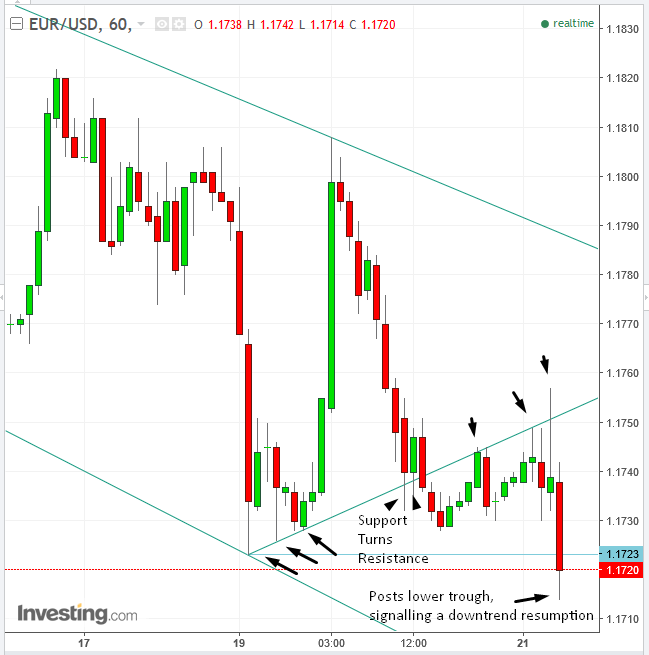
The Stoxx Europe 600 Index fell, though the euro eked out a gain, after yesterday’s worst slide in three weeks. The single currency could be headed still lower.
The dollar received a boost when its biggest currency partner, the euro, fell 0.31 percent yesterday, closing near the low of the session, a sign that after an initial 0.31 percent advance, euro bears went home smiling. The euro first fell in early trading yesterday, after Merkel's month-long coalition negotiations collapsed, even as the EU requires stability for Brexit negotiations.
However, after German PPI met expectations, the euro rebounded on the region’s continued economic growth. At the end of the day, however, the rebound was struck by technicals, when the price reached a resistance line, where supply has been overcoming demand, at the falling channel top. We forecast yesterday (link above) that the euro would retest the 1.1730 level. It did, and is now poised to resume the downtrend, to retest its post-German election low of 1.1554.
While the currency failed to survive the political uncertainty, Germany’s DAX bounced from a seven-week low. As has been said before, and it's particularly true this year, while currency and commodity traders are very sensitive to geopolitics, ever since the Brexit vote of June 2016, equity investors continuously brush off the headlines. So, while euro traders sold off and the currency resumed its downtrend, equity traders seemed to have decided that even though the coalition talks failed, it won’t threaten the economy.
Equities gain another benefit when their base currency slides. Local company exports become more competitive even as local shares become cheaper and thus more appealing to international investors.
Despite the Asia rally, shares in Europe took a step back at the open, as equity traders showed they were being mindful of politics, a relatively rare occurrence. German Chancellor Angela Merkel announced she’s prepared to stand for early elections, sending bunds higher.
The Turkish lira reached a new all-time low against the dollar, after the USD/TRY pair climbed above the January 11, 3.9423 peak, posting a new record high of 3.9779 and settling on 3.9592, as of 4:15 EDT.
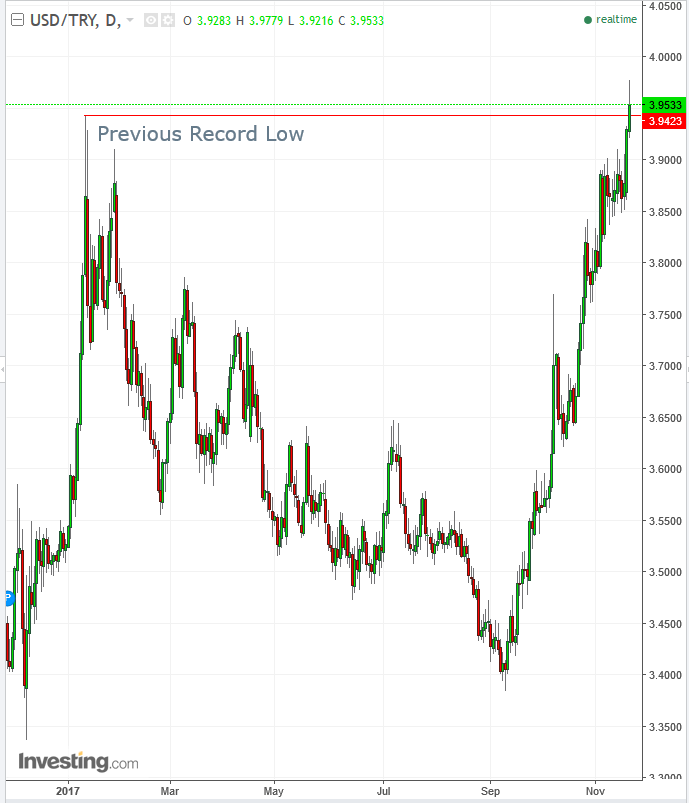
Recent attempts by the Turkish central bank to support both the lira as well as Turkey's sovereign bonds have failed to bolster either asset. The central bank announced it would auction as much as $3 billion in instruments till the end of the year to help corporate borrowers manage foreign exchange positions. The currency still weakened more than 1 percent and yields on 10-year lira debt surged to a record 13.01 percent. Even today's announcement by the central bank that it would cut bank borrowing limits barely helped the floundering currency.
Except for its pairing with the Turkish lira, the dollar was little changed since yesterday when it rebounded from a 0.46 percent decline to close near the top of its range, on a 0.06 percent advance, leaving it with just a 0.50 percent reversal.
The rise of the USD, the base currency for precious metals, makes them more expensive, reducing demand which in turn causes prices to fall.
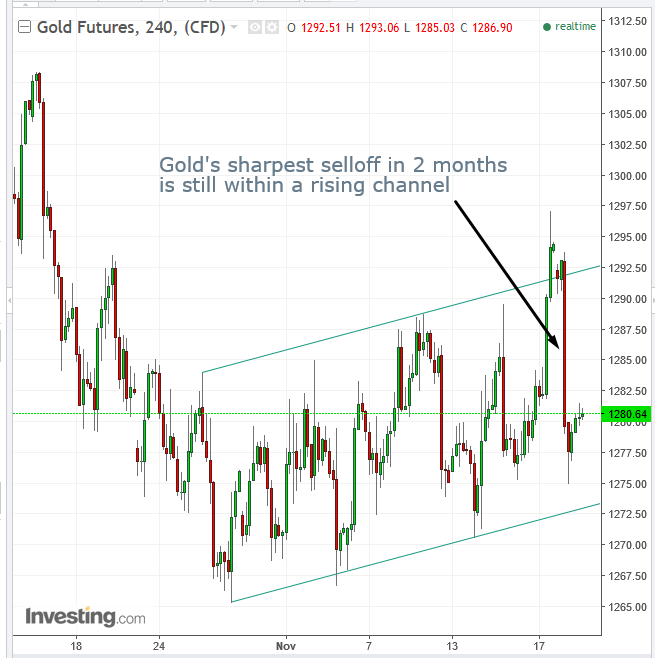
Gold also suffered a risk-on selloff, pushing it to its biggest fall in two months. Like the dollar, precious metals today were little changed.
The UK’s sweetened “divorce” bill to the EU spurred a potentially slower UK economic growth outlook. This is putting sterling and gilt traders on the defensive. Although the pound received a boost yesterday on reports the UK was prepared to double the “divorce” bill, the currency is still locked in a range since October 13.
The Australian dollar fell to a five-month low after the central bank signaled that low interest rates are here to stay, for now.
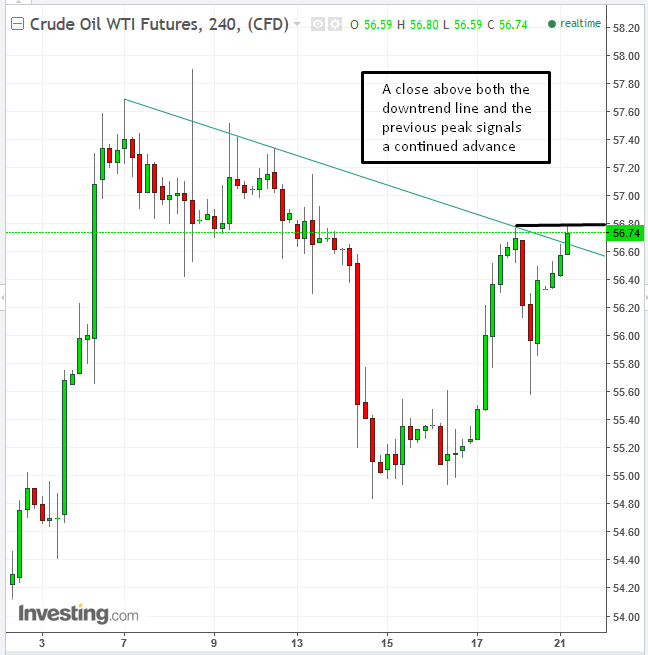
Oil rebounded, paring losses. The commodity is now eyeing its two-year high resistance, ahead of US government data to be released tomorrow, forecast to show crude stockpiles resumed declines.
Up Ahead
- Minutes from the European Central Bank’s October meeting, due on Thursday, could show dissent in the discussion about tapering.
- In Asia, Singapore 3Q GDP is due on Thursday. New Zealand's October trade and South Korea's November consumer confidence figures are due later in the week.
- Reports on sales of previously owned homes and durable goods orders for October are due Tuesday and Wednesday respectively in the U.S.
- The U.K. announces its budget Wednesday.
Market Moves
Stocks
- The Stoxx Europe 600 Index decreased 0.3 percent as of 8:17 a.m. London time.
- The U.K.’s FTSE 100 fell 0.3 percent to the lowest in almost eight weeks.
- Germany’s DAX increased 0.5 percent to the highest in more than a week.
- The MSCI Emerging Markets Index jumped 0.9 percent to the highest in more than six years.
- S&P 500 Futures declined 0.1 percent.
Currencies
- The Dollar Index remained steady at 94.06, holding on to yesterday’s 0.42 percent gain.
- The euro advanced 0.2 percent, the largest gain in a week.
- The British pound advanced 0.2 percent to $1.3261, reaching the strongest in three weeks on its sixth consecutive advance.
- The Japanese yen advanced 0.1 percent to 112.48 per dollar.
Bonds
- The yield on 10-year Treasuries decreased one basis point to 2.36 percent.
- Germany’s 10-year yield decreased one basis point to 0.35 percent, the lowest in almost two weeks.
- Britain’s 10-year yield was unchanged at 1.292 percent.
Commodities
- West Texas Intermediate crude advanced 0.2 percent to $56.53 a barrel.
- Gold climbed 0.3 percent to $1,280.78 an ounce.
- Copper declined 0.1 percent to $3.11 a pound.
